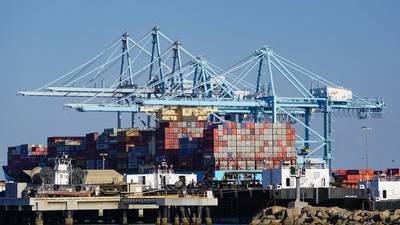FMC Examining How Data Can Improve Ocean Cargo Velocity
The U.S. Federal Maritime Commission (FMC) said it has set out to identify data constraints that impede the flow of ocean cargo and add to supply chain inefficiencies as severe bottlenecks continue to hamper global supply chains.
Launched at the direction of FMC Chairman Daniel B. Maffei and spearheaded by Commissioner Carl W. Bentzel, the initiative seeks to to pinpoint how data can contribute to the long-term reliability of the domestic cargo delivery system. It will also aim to propose recommendations for common data standards used by the international shipping supply chain, as well as access policies and protocols that would streamline information sharing across the ocean supply chain. Initial findings will be presented at a Maritime Data Summit in Spring 2022.
“Events of the past year have proven the need for the United States to achieve more capacity from our cargo delivery system. Information sharing and additional transparency in how containers move is one way we can move more containers more efficiently. I appreciate Commissioner Bentzel’s willingness to take on this project and I am confident his work will lead to beneficial and implementable recommendations,” said Chairman Maffei.
Over the course of the project Commissioner Bentzel will conduct research, interviews, round tables, and hold public meetings to inform the “status quo” in maritime data. He will explore what common ocean shipping data is created with each hand-off of a container through the supply chain, how that data is stored and shared, and identify what are the critical data elements used by each supply chain party. Ocean carriers, marine terminal operators, truckers, railroads, and other government agencies are among those who will be invited to provide insight about data definitions, classification, and recommendations for improving interoperability of data records involving container shipping. Input from the Commission’s National Shipper Advisory Committee may also be solicited as part of the project. Initial deliverables will include a data inventory and recommendations for common standards.
The first public meeting Commissioner Bentzel will hold is scheduled to take place next month in Washington, D.C. While the agenda for the meeting is still being set, planned speakers will include representatives from the Biden Administration, data experts, standards setting specialists, and representatives from FMC’s National Shippers Advisory Committee.
“I have already met with many port industry leaders and stakeholders around our coastlines, and the topic of reliable, actionable operational shipping information to help more efficiently move cargo was one of the foremost topics of concern. When you go through a U.S. airport you know how and where to park your car, you know that you will be transported to the airport terminal, when you get to the terminal you will be provided information on your gate and information about when your plane will depart and land, adequate personnel are available to handle luggage and run it through security throughout this process, and it is repeated at landing. The maritime industry does not have a similar system in place. Given the immense national economic impact and our Nation’s reliance on ocean shipping, sustained surges in cargo volumes and other operational impacts caused by COVID-19, it is clear to me that we need to develop a stronger system of information for the shipping public. The FMC will work with the industry to develop greater systems of transparency for services surrounding the international intermodal transportation of goods. Our port gateway corridors are limited by physical constraints and the best options for efficiencies lie with the greater utilization of information technologies and coordination between the different modes in the supply chain,” said Commissioner Bentzel.
The project is the latest effort by the Federal Maritime Commission to address supply chain efficiency and congestion issues. Other initiatives include Fact Finding 29, the Vessel-Operating Common Carrier (VOCC) Audit Program, investigating certain ocean carrier fees and surcharges, issuing a Notice of Inquiry into the use of merchant clauses in VOCCs’ bills of lading to require payment from entities that are not in contractual privity with the VOCC.











